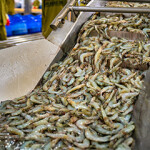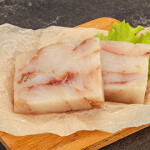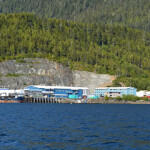Trump vows to escalate lobster trade war with EU, Canada, China

At a fisheries roundtable discussion in Bangor, Maine, U.S.A., on 5 June, U.S. President Donald Trump signed a proclamation to allow commercial fishing in the Northeast Canyons and Seamounts Marine National Monument. The change falls short of eliminating the monument entirely, and does not lift a prohibition on gas and oil drilling in the area, but rather is "taking down a no-fishing sign," according to Secretary of the Interior David Bernhardt, who was at the table for the discussion.
President Barack Obama created the Northeast Canyons and Seamounts monument in 2016. President George W. Bush was the first to apply the act to the seafloor, when he declared the Papahānaumokuākea Marine National Monument in Hawaii in 2006.
The Northeast Canyons and Seamounts was the first (and currently only) Atlantic marine monument, and at nearly 5,000 square miles in size, is the smallest in the nation. The designations were made using the authority of the 1906 Antiquities Act. The Antiquities Act gives presidents the ability to restrict public and private use of federal lands, but has traditionally been used to declare monuments on land.
“America is blessed with some of the richest ocean resources anywhere in the world, except when they close it up, and yet we have a USD 16.6 billion [EUR 14.7 billion] seafood trade deficit and import over 85 percent of the seafood we consume. And no wonder, you have 5,000 miles that’s closed up. So we import 85 percent of our fish from other countries that are your competitors, and we have the best fishing areas in the world, I would think?”
Trump's opening remarks included reference to his executive order issued on 7 May, which initiated a review of federal fisheries laws, created a seafood trade task force, and initiated a clampdown on illegally harvested seafood. Later, during the roundtable discussion, Trump named former Maine Governor Paul LePage to head the newly established task force.
“I ordered the formation of a trade task force that will identify opportunities to open foreign markets to our seafood exports. We’re going to talk about the European Union, who constantly take advantage of us on trade. Nobody knows that,” Trump said, later adding, “There’s nobody better than Paul LePage to get this going.”
Retaliating against European Union tariffs on lobster, which range from 8 percent to 20 percent depending on product form, became a recurring theme for the president in the discussion. Canadian lobster sold into the E.U. is exempt from tariffs due to the Comprehensive Economic and Trade Agreement (CETA) trade deal signed in 2017.
“You folks are going to tell me about the E.U., okay, with respect to their tariffs,” Trump asked the panel. “Because I like tariffing things. So you’re going to tell me about that, okay, with regard to lobster.”
LePage said Canada doesn't pay a tariff for lobster sent to the E.U., but that lobster sent directly from the United States was subject to E.U. tariffs. He also said Chinese tariffs had damaged the industry.
"Two years ago, we were sending a lot of product to China," LePage said. "And then China put a tariff on us of 40 percent because of some of the trade issues between the two countries."
"And what happened to the tariff? Is it on now?" Trump asked him.
"Oh, it's not gone down," LePage said. "I haven't checked lately, but you're still paying the tariffs, right?" he asked the panel.
The Chinese tariffs are the latest escalation in a trade war that started when the Trump administration levied tariffs on USD 250 billion (EUR 221 billion) in Chinese imports in 2018.
"You're saying China charges a 40 percent tariff, and how big is the tariff that the European Union charges?" Trump asked, changing course.
"Twenty, it's 20 or 22," LePage replied.
In response, Trump tasked Bernhardt and U.S. Office of Trade and Manufacturing Policy Director Peter Navarro with increasing tariffs on cars imported from the E.U. as retaliation.
“So Canada, doesn't pay a tariff for the same exact lobster in the same waters. But we pay a tariff. If European Union doesn't drop that tariff immediately, we're gonna put a tariff on their cars, which will be equivalent coming in... it's going to be the equivalent-plus... watch how fast that tariff comes off."
Trump also asked Navarro to identify Chinese products to target for potential tariffs if China did not lower its duties on U.S. lobsters.
“Peter Navarro is going to be the lobster king now,” he said.
Industry representatives who spoke at the meeting included Kristan Porter, president of the Maine Lobstermen's Association; Atlantic Red Crab Co. Owner Jon Williams; Maine groundfish fisherman Jim Odlin, who also served on the New England Fishery Management Council; Mary Beth Tooley, government affairs for the O'Hara Corp.; Terry Alexander, a fourth-generation Maine fisherman and current member of the council; Frank O'Hara Jr., president of O'Hara Corp., which runs boats in Maine and Alaska; and Maggie Raymond, executive director of the Associated Fisheries in Maine.
In their remarks, many of the panelists complained the monument's designation had disregarded the council’s decision-making process. Before the monument’s designation, the area had been managed under the purview of the New England Fishery Management Council, which requires public and stakeholder input before it makes any large-scale changes, such as placing large areas of ocean off-limits to fishing.
"The process by which this monument was established is a nontransparent process that does not allow for stakeholder input, does not produce any kind of economic impact analysis of the negative impacts and prevents all of us from enjoying the benefits of our healthy marine resources," Raymond said.
Photo courtesy of Jes Hathaway/National Fisherman






Share